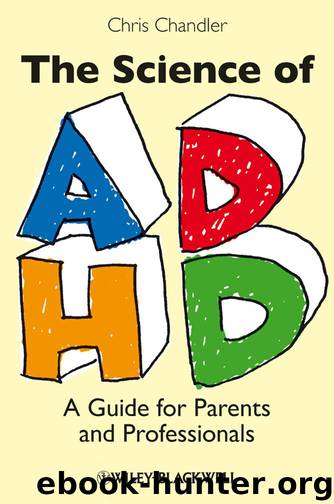The Science of ADHD: A Guide for Parents and Professionals by Chris Chandler

Author:Chris Chandler
Language: eng
Format: mobi
ISBN: 1405162341
Publisher: Wiley-Blackwell
Published: 2010-07-27T21:00:00+00:00
Pemoline
Pharmacology
Once marketed as Cylert, pemoline has been used to a lesser extent in the treatment of ADHD since 1975. Unlike methylphenidate and amphetamine, pemoline has no effect on noradrenergic systems (see [837]). Pemoline action is to increase DA release and block its reuptake [838–839]. The half-life of pemoline is 8.6 hours [840], with some finding effects still after 7 hours [841]. Therefore the advantage of pemoline is that a single dose can last a long time, thereby avoiding multiple dosing [837].
Clinical effects
There are comparatively few studies that have looked at pemoline in ADHD. Back in the days of minimal brain dysfunction, pemoline was seen to have a beneficial effect especially because of its duration of action [842–843]. In a study of ADHD children using a number of outcome measures, pemoline was seen as an effective treatment [844]. It was associated with an improvement in college students [845], in adolescents [846], and in adults it was better than placebo [847], but there appears to be a reduced effect of pemoline in adults because of adverse effects [848]. Whilst a benefit of pemoline over methylphenidate was seen in one study, adverse reactions to pemoline were greater and sufficient to prevent further use [849]. Another benefit with pemoline is its lack of abuse potential [850]. However, one paper does report a case study of pemoline abuse, but this was induced by prior amphetamine abuse [851].
Side-effects
One of the recurrent side-effects of pemoline that is reported is its hepatotoxicity. This can range from increases in liver enzymes through to full liver failure [852–854]. Such was the concern that the manufacturers stated it should not be a first-line medication for ADHD [837]. In contrast the effects of pemoline on growth appear to be transient [855]. Like methylphenidate, pemoline induces insomnia [841, 844] and is associated with abdominal pain and headaches [837].
Download
This site does not store any files on its server. We only index and link to content provided by other sites. Please contact the content providers to delete copyright contents if any and email us, we'll remove relevant links or contents immediately.
| Administration & Medicine Economics | Allied Health Professions |
| Basic Sciences | Dentistry |
| History | Medical Informatics |
| Medicine | Nursing |
| Pharmacology | Psychology |
| Research | Veterinary Medicine |
Periodization Training for Sports by Tudor Bompa(8252)
Why We Sleep: Unlocking the Power of Sleep and Dreams by Matthew Walker(6700)
Paper Towns by Green John(5177)
The Immortal Life of Henrietta Lacks by Rebecca Skloot(4572)
The Sports Rules Book by Human Kinetics(4379)
Dynamic Alignment Through Imagery by Eric Franklin(4208)
ACSM's Complete Guide to Fitness & Health by ACSM(4052)
Kaplan MCAT Organic Chemistry Review: Created for MCAT 2015 (Kaplan Test Prep) by Kaplan(4004)
Introduction to Kinesiology by Shirl J. Hoffman(3765)
Livewired by David Eagleman(3763)
The Death of the Heart by Elizabeth Bowen(3605)
The River of Consciousness by Oliver Sacks(3598)
Alchemy and Alchemists by C. J. S. Thompson(3513)
Bad Pharma by Ben Goldacre(3421)
Descartes' Error by Antonio Damasio(3270)
The Emperor of All Maladies: A Biography of Cancer by Siddhartha Mukherjee(3145)
The Gene: An Intimate History by Siddhartha Mukherjee(3093)
The Fate of Rome: Climate, Disease, and the End of an Empire (The Princeton History of the Ancient World) by Kyle Harper(3055)
Kaplan MCAT Behavioral Sciences Review: Created for MCAT 2015 (Kaplan Test Prep) by Kaplan(2981)
